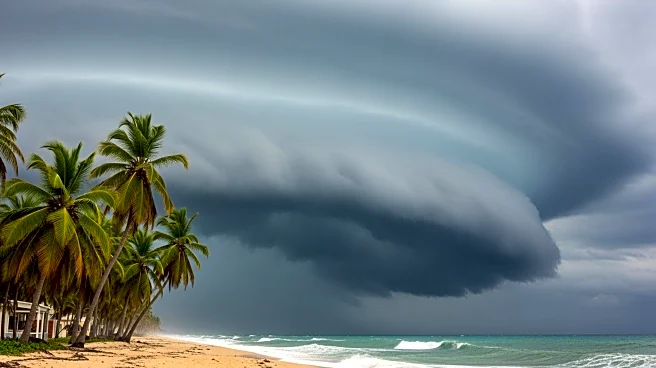What's Happening?
A recent analysis has revealed that human-induced climate change significantly amplified the destructive power of Hurricane Melissa, which recently impacted the Caribbean. The study, conducted by World Weather Attribution, found that climate change increased
the hurricane's maximum wind speeds by 7% and intensified rainfall by 16%. The storm, one of the strongest Atlantic hurricanes to make landfall, caused extensive damage across Jamaica, Haiti, the Dominican Republic, and Cuba, resulting in numerous fatalities and widespread destruction. The analysis highlighted that the ocean temperatures in Melissa's path were approximately 1.4°C warmer than pre-industrial levels, contributing to the storm's severity.
Why It's Important?
The findings underscore the growing influence of climate change on extreme weather events, particularly hurricanes. As ocean temperatures rise due to global warming, hurricanes are likely to become more intense, leading to greater economic and human losses. The study's results are consistent with existing research linking climate change to the rapid intensification of hurricanes, which poses significant challenges for disaster preparedness and response. The increased wind speeds and rainfall associated with such storms can lead to more severe damage to infrastructure, agriculture, and communities, particularly in vulnerable regions like the Caribbean.
What's Next?
The study's implications suggest a need for enhanced climate adaptation and mitigation strategies to address the increasing threat of intensified hurricanes. Policymakers and stakeholders may need to invest in resilient infrastructure and disaster response systems to better protect affected regions. Additionally, the findings could influence future climate policy discussions, emphasizing the urgency of reducing greenhouse gas emissions to mitigate the impacts of climate change on extreme weather events.
Beyond the Headlines
The analysis also highlights the ethical and social dimensions of climate change, as the most vulnerable populations often bear the brunt of its impacts. The increased frequency and intensity of hurricanes could exacerbate existing inequalities, making it crucial for global efforts to address climate justice. Furthermore, the study's rapid attribution methodology provides a valuable tool for understanding the immediate effects of climate change on weather events, offering insights that can inform both scientific research and public policy.

















